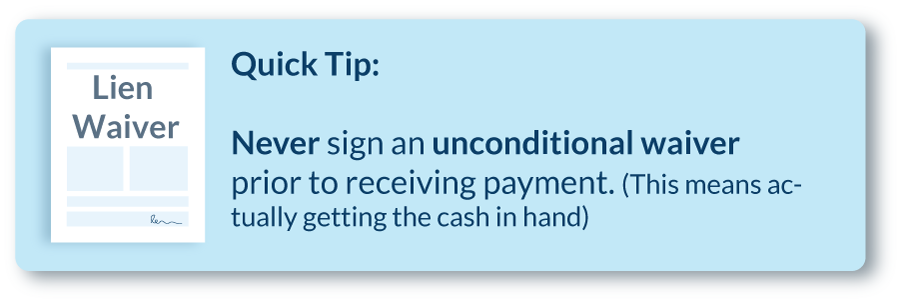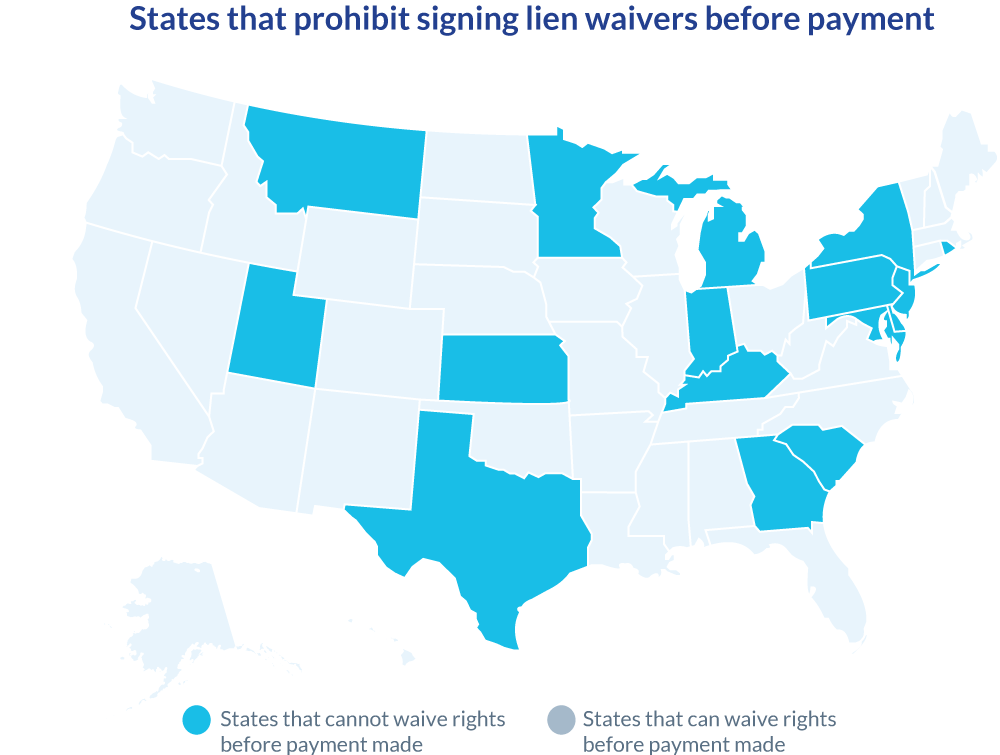
Editor’s Note: This article was originally published in 2015 and was updated with new information in 2018.

Accordingly, the parties working on a project routinely sign and deliver lien waivers in order to receive payment. While this is usually a fairly straightforward process, there can be some confusion as to the timing of the exchange. Generally, we have found that this confusion is a result of parties that either:
1) don’t fully understand how the lien waiver process can be used to benefit both parties; or
2) are forced into a particular waiver situation with which they are uncomfortable.
In the following article, we’re going to clear up some of this confusion about exchanging lien waivers.
What is the Issue with Signing a Lien Waiver?
When you get right down to it, the real problem is this:
The party making the payment doesn’t want to pay until they have received the signed lien waiver, and the party signing the lien waiver doesn’t want to waive the right to secure the money owed until the payment is actually received.
While both sides of this equation make sense, a better understanding of the lien waiver process can help to avoid this impasse. Until lien waivers are widely understood, there will continue to be questions and problems that arise from the “simple” exchange of lien waivers.
One of the largest and most important of these questions is: “Can I be forced to sign a lien waiver in order to receive payment?”
Can You be Forced to Sign a Lien Waiver Before Receiving Payment?
As mentioned immediately above, the question of whether a party can demand a signed lien waiver prior to giving payment is a relatively hot topic, and the answer can have a significant impact.
The answer to the question has two related parts, each of which is relatively simple:
1) an unconditional waiver should never be signed prior to actual receipt of the funds, and
2) the answer to whether a lien waiver may be required prior to payment only matters in regard to “unconditional waivers”.
Bottom Line: Never Sign an Unconditional Lien Waiver Prior to Receiving Payment!
Let me repeat: NEVER sign an UNCONDITIONAL WAIVER prior to receiving payment. (This means actually getting the cash in hand — just getting a check is not good enough.)
In the event that the money is not paid, what matters most is what is written on the lien waiver (i.e. the amount that the lien waiver says a party received), not what that party actually was paid.
While this may seem counterintuitive, it actually makes a lot of sense. A property owner must be able to rely on a lien waiver received from a party below in order to justify payment. If the lien waiver is the only proof the owner has as to whether a particular party has been paid, the owner must be able to rely on it in order for the lien waiver to accomplish its purpose. Because of this, it can be dangerous (and it is always ill-advised) for a party to sign an unconditional waiver prior to the actual receipt of funds.
What happens if the paying party is demanding an unconditional waiver prior to releasing payment?
Whether or not this is allowable will be discussed shortly, but at the very least this should be a warning sign. It could be a sign of the financial distress of the GC, a misunderstanding of the lien waiver process, or an attempt to “bully” a party with less leverage.
Many States Prohibit Signing Lien Waivers Before Payment
In many states, requiring an unconditional lien waiver be delivered prior to receipt of the actual payment is not allowed by statute. Requiring a party to waive lien rights prior to payment (even if payment is contemplated) is akin to a “no lien clause” in a contract. Several states have determined this to be unallowable.
Clearly in states with laws such as this, a party is unable to mandate that an unconditional lien waiver be signed and delivered prior to the receipt of funds.
In states where prospective lien waivers are allowed, however, the answer may be different. This means that a potential lien claimant may be able to (accidentally) waive the rights to file a mechanics lien without ever receiving payment. This is why unconditional lien waivers should never be signed unless the money is in the bank. While a party in such a situation may be able to recover through a breach of contract lawsuit, the loss of the ability to encumber the property through a mechanics lien can be a serious blow.
All of this can be avoided, however, through the intelligent use of lien waivers and an understanding of how lien waivers can be used to the benefit of all parties. The prior discussion was focused solely on “unconditional” lien waivers, because those are the lien waivers that can be detrimental to a potential lien claimant’s rights even without payment being received.
CONDITIONAL Lien Waivers are an Easy Solution
Since conditional lien waivers are only effective to waive lien rights immediately upon some particular condition being met (generally, the receipt of payment), both parties can rest easy when using conditional waivers.
Essential Lien Waiver Resources
- Read The Ultimate Guide to Lien Waivers
- If you have any questions, feel free to get in touch with us. We’re here to help you get paid.





